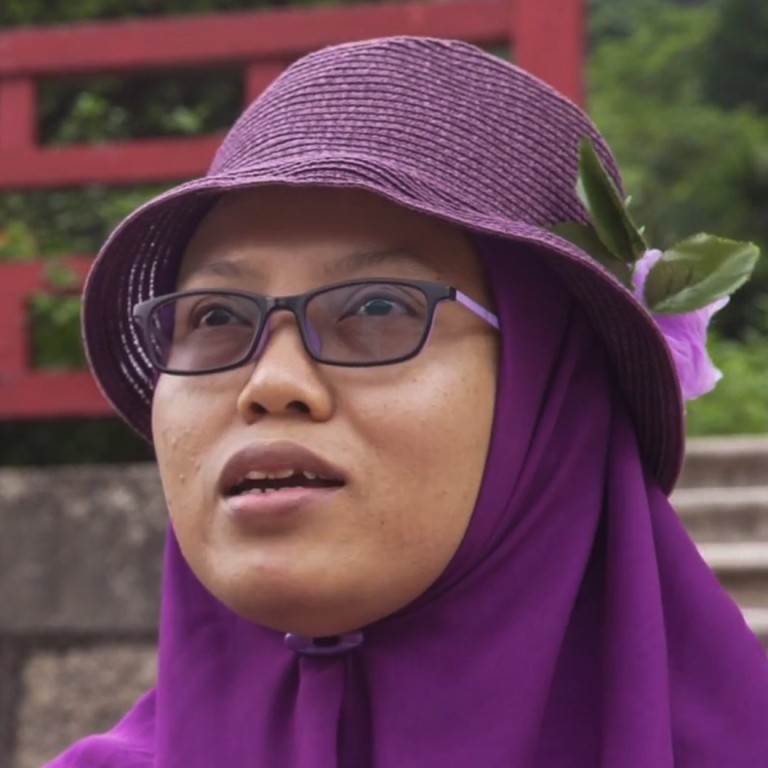
Immigration officials deport Indonesian domestic worker who covered Hong Kong protests as a citizen journalist and was arrested for overstay
- Yuli Riswati, 39, who worked in Hong Kong for about a decade, launched an Indonesian news portal in March, writing on migrant helpers and, later, protests
- A recipient of the Taiwan Literature Award for Migrants, Yuli was arrested for overstay in September after her visa expired in July
An Indonesian domestic worker who covered Hong Kong’s protests as a citizen journalist was deported on Monday following her arrest for overstaying her visa in September.
Supporters of Yuli Riswati, 39, accused the government of sending her home for reporting on the social unrest for the not-for-profit Indonesian online news outlet, Migran Pos, that she had launched in March.
But the Immigration Department, while declining to comment on individual cases, stressed that the Hong Kong laws gave them the power to arrest, detain, prosecute and deport anyone for violating their conditions of stay.
A spokesman of the department said it always dealt with cases fairly and impartially before making a decision.
Fish Ip Pui-yu, a regional coordinator of the International Domestic Workers’ Federation, which has affiliates in 55 countries, said that Yuli forgot to renew her work visa, which expired in July.
Immigration officers came to her flat in September and arrested her.
“During my 20 years [as an activist], I have never heard of immigration officers arresting domestic workers at their employers’ flats for expiry of their visas,” Ip said.
Indonesian maid who worked in Hong Kong probed for links to Medan bombing
Yuli’s lawyer, Chau Hang-tung, also said she had never heard of such an arrest, while admitting the immigration officers were legally allowed to do so.
Other activists also said that the Immigration Department would always allow domestic workers to renew their passports if their employers wrote to the department supporting the renewals, even if the statements were submitted after the expiry. Yuli’s employer had done so after her visa expired.
During a court trial last month, prosecutors offered no evidence and withdrew the overstay charge against Yuli. Chau said that when Yuli paid a visit to the Kowloon Bay immigration office later that day, she was in turn sent to the Castle Peak Bay Immigration Centre.
She subsequently spent almost a month there before she was put on a flight back to Indonesia on Monday.
Ip said that last week the department told Yuli if she withdrew her visa renewal application, she would not have to face detainment any longer and could go back to Indonesia. Ip said Yuli eventually agreed to this because she had caught a cold and had been unwell.
In September, Yuli, who worked in Hong Kong for about a decade, spoke to the Chinese-language newspaper Ming Pao about covering the protests.
By the time Hong Kong deported 1,319 people, Macau kicked out 6,000
Before the protests erupted in June, she mostly wrote about Indonesian helpers’ activities in Hong Kong. But since the protests started, she attended the demonstrations every Sunday whenever she got a day off.
She told Ming Pao that her articles were factual and did not carry her personal opinions.
Teresa Liu Tsui-lan, managing director of the Technic Employment Service Centre, also said she had never heard of immigration officers arresting domestic workers at their homes because of visa expiry in her 30 years in the business.
She said that as long as employers had written to the department that they wanted to re-employ a domestic worker, the department would always renew the visa.
However, Liu refused to believe that Yuli was deported for writing about the protests, saying there could be other reasons not made public.
Cynthia Abdon-Tellez, general manager of the Mission for Migrant Workers, an NGO, also said Yuli’s case was rare.
Eman Villanueva, spokesman for the Asian Migrants’ Coordinating Body, said: “It’s not a usual practice for the department to just go to an employee’s place to arrest him or her for overstay. But at the same time, it is not impossible either, especially if the department has been informed of an overstay.”
Last year, Yuli was awarded the Taiwan Literature Award for Migrants for her writing.

